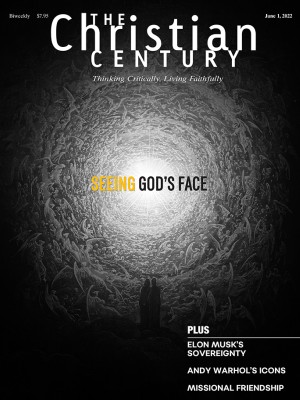Unexpected revelation
My conversation partner may have been a prophet—or a quack. My job was simply to listen.

I’m a last resort. People talk to their pastor—fair enough, it’s what pastors are there for. The pastor, it seems, feels a bit daunted; doesn’t have time, fears there may be mental health issues, prevaricates, suggests books to read, eventually finds someone with wider responsibility to handle it. That weightier person looks over their spectacles, feels equally nervous, and scratches around for someone to pass this person on to.
Me, it turns out. It’s the result of being a dual-vocation pastor and theologian and being on the radio a lot. So I get a plaintive email saying, “I know you’re busy . . . you were recommended . . . no one seems to know what to do with me.” It’s not your everyday message. This person’s clearly got staying power.
Read our latest issue or browse back issues.
Zoom was invented for those too nervous to make a first pastoral contact in person. You have to yield your email address, but otherwise you can size each other up without too much trepidation. You can also listen. So I listened to this person to whom it seemed no one had listened for a very long time.
Turned out they had a lot to say. But it was mixed up with frequent interjections like “You don’t think I’m . . . ?” and “Everyone seems to think . . .” After 45 minutes I was tiring of the disclaimers but intrigued by the story. It was clear I was being invited to pass judgment. So I did.
“Can I tell you something?” I asked. “Have you ever thought about what the Bible is? It didn’t just float down from the sky with some kind of disembodied hand like Thing on The Addams Family. It wasn’t all written on a wall like at Belshazzar’s feast. The Bible’s largely made up of moments of revelation experienced by individuals or groups and subsequently cherished by communities. They were written down because those communities found them to be harbingers of life or avenues of light and they wanted them to bring truth to subsequent generations. Any pastor who tells you you’re talking nonsense just because you’re saying things they’ve never heard before is doing their office a disservice. The whole point of being a pastor is to bring people into the presence of God or to help them realize they’re already there. You already know you’re in the presence of God, and you seem to have frightened your various pastors off. Here’s the good news: you’re a prophet. Here’s the bad news: prophets seldom get a good hearing, because they always say things people don’t want to hear.”
My conversation partner started to weep. This could clearly go either way, so I thought I’d wait and see. Fortunately, I was in luck. “I can’t tell you what it means to be heard. I’ve been waiting all this time. It’s not like I wanted or asked to see these things. They just came to me. But no one wanted to know.”
God sends us seers and mystics, and we’re too busy or too scared to listen to them. Oscar Wilde warned us there’s only one thing worse than not getting what you want, and that’s getting it. It seems pastors live that truth every day.
Two weeks later I found myself face-to-face with a person I knew well. No need for Zoom; we went for coffee. But this person, too, seemed not to have got the memo about pastors being too busy for revelation. Before I knew it I was being enlightened about the deep secrets of human connectedness, power, and manipulation—and my conversation partner seemed intent on relating all this to God. I found myself resisting. Revelation is for unusual people you’ve never met before, with eyes that stare longer than you’re comfortable with and overactive intuition. Not for people you’ve known a long time.
But then I reflected on the pastors I’d chided in my heart a fortnight earlier. I realized I’d become one of them. As the grand new theory was laid out before me, I kept saying to myself, You don’t have to judge this! You’re not the Grand Inquisitor. You’re a pastor. Listen. Appreciate. Remember. Reflect back. Do nothing that suggests you’re out of your depth. This isn’t about you. You’re mediating as a person discerns how and where they’ve met God. Just enjoy it. And I did.
Time and distillation will tell if either of these disclosures come to be more widely perceived as revelation. The point is, my job was to recognize that God does speak and to let people delight in God speaking to them, not to become a theological censor or quack psychiatrist.
What would happen if we pastors actually conveyed to our flocks that God longs to be made known to them? Have we fallen into assuming the word of the Lord is rare in these days? Maybe all our training has created in us an antidote to faith: In the unlikely event that revelation might ever occur, it could only, possibly be through me.






